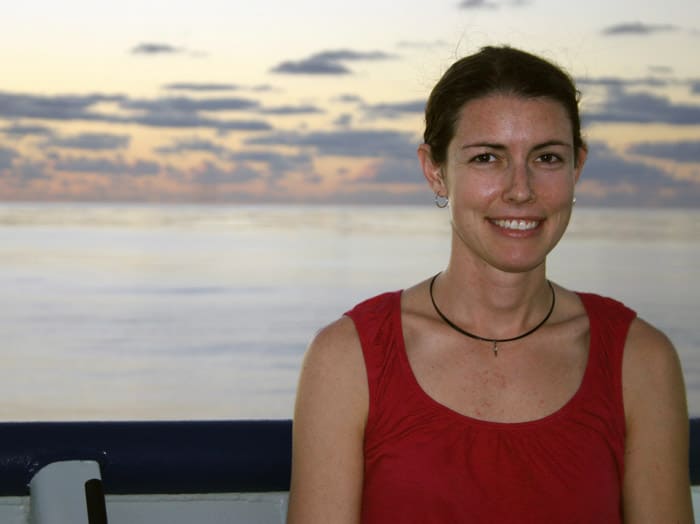Dr. Karen Lloyd Receives WHOI’s Holger W. Jannasch Visiting Scholar Award
 Karen Lloyd, an assistant professor in the Department of Microbiology at the University of Tennessee in Knoxville, has been chosen as the recipient of the Holger W. Jannasch Visiting Scholar Award. (courtesy of Karen Lloyd)
Karen Lloyd, an assistant professor in the Department of Microbiology at the University of Tennessee in Knoxville, has been chosen as the recipient of the Holger W. Jannasch Visiting Scholar Award. (courtesy of Karen Lloyd) May 25, 2012
The Woods Hole Oceanographic Institution (WHOI) has chosen Karen Lloyd, an assistant professor in the Department of Microbiology at the University of Tennessee in Knoxville, as the recipient of the Holger W. Jannasch Visiting Scholar Award.
The award recognizes Lloyd for her “outstanding contributions to the field of marine microbiology,” as well as her demonstrated excellence in mentoring students and commitment to educational public outreach.
Lloyd is currently pushing the frontiers of the field by analyzing the diversity and function of yet-to-be cultivated bacteria and archaea—a group of single-celled microorganisms—in deep subseafloor sediments using single-cell genomics and other cutting-edge techniques. Her research focuses on linking uncultivated microorganisms to their geochemical functions and exploring how these communities react to changing environmental conditions.
Lloyd will visit WHOI the week of July 9-13, 2012, and present two lectures to students and scientists in the Woods Hole community. The first talk, on a general scientific topic, will be Monday, July 9, 2012, at 3 p.m. in Redfield Auditorium. Lloyd will present a second talk, which will focus on her research, Wednesday, July 11, 2012, at noon in Clark 507.
“This is a wonderful opportunity to recognize a talented young microbiologist while celebrating the legacy of Holger Jannasch, who shaped the field of marine microbiology,” said WHOI Biology Department Chair Mark Hahn.
The visiting scholar award is named in memory of Jannasch, a WHOI senior scientist in the Biology Department and world-renowned, deep-sea microbiologist, who died in 1998. During his illustrious career, he isolated and cultivated many microbes, studied their physiology and adaptations to the environment, and explored associations between microbes and animals. He also was involved in designing sophisticated instrumentation for collecting and culturing bacteria, as well as to measure rates of microbial activity in the deep-sea. Jannasch and his WHOI colleagues performed pioneering work investigating microbial decomposition rates in the deep sea.
Following the discovery of deep-sea hydrothermal vents in the late 1970s, Jannasch’s lab again played an instrumental role in identifying chemosynthesis as the nutritional basis for life at deep-sea vents, which has had major implications for deep-sea microbial ecology and the way we think about the origin of life on Earth.
“My first exposure to oceanography was working as a lab technician at WHOI for Andreas Teske—Holger Jannasch’s successor—a year after Dr. Jannasch’s passing. His work influenced nearly every aspect of the field of deep sea microbiology, and I am honored to receive the award that bears his name,” Lloyd said.
During her work at WHOI, Lloyd helped characterize the physiologies of some of the hyperthermophilic (heat loving) archaea that Jannasch discovered.
Lloyd received her master’s and Ph.D. degrees from the University of North Carolina. She did her postdoctoral research with Dr. Bo Barker Jørgensen, a world-renowned biogeochemist at the Center for Geomicrobiology in Aarhus, Denmark, where she was able to obtain the first single cell genome from uncultured subsurface archaea. She will make the first public presentation of that data as a keynote speaker at the 2012 Goldschmidt Geochemistry Conference held in Montréal from June 24-29.
The Holger W. Jannasch Visiting Scholar Award is given in recognition of a recent Ph.D. recipient (within four years of receiving the degree) “whose scholarly interests would have appealed to Jannasch given the breadth and depth of his research.” Candidates may be nominated by WHOI students, postdocs, scientific and technical staff. Appointments are made by the Biology Department Chair on the recommendation of a three-person committee consisting of a graduate student, a postdoctoral scholar, and a scientific staff member.
Scholar visits are held during the summer months to allow for greater interaction with scientists and students from both WHOI and the Marine Biological Laboratory (MBL) in keeping with the spirit of Jannasch’s work. Jannasch, who taught courses in marine microbiology, microbial ecology and microbial diversity at MBL, served as a vital link between the two institutions for many years.
Jannasch was passionate about education and teaching, particularly at the postgraduate level. He viewed the postdoctoral years as “the most important learning period in a scientist’s career,” and was keen to encourage postdocs to become independent and develop original ideas.
“I think Karen Lloyd exemplifies everything Dr. Holger Jannasch would have wanted to see in a young scientist—creativity, passion, scientific curiosity, and perseverance,” said WHOI biologist Stefan Sievert, who nominated Lloyd for the award. “She’s a very worthy person to receive this award to continue Holger Jannasch’s legacy.”
The Woods Hole Oceanographic Institution is a private, non-profit organization on Cape Cod, Mass., dedicated to marine research, engineering, and higher education. Established in 1930 on a recommendation from the National Academy of Sciences, its primary mission is to understand the ocean and its interaction with the Earth as a whole, and to communicate a basic understanding of the ocean’s role in the changing global environment.

